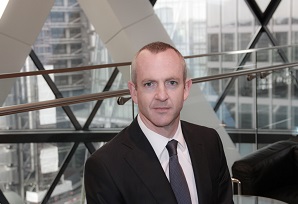Swiss Re's CEO Frank O'Neill on the importance of owning the way you work for wellbeing

As a CEO what is your primary reason for addressing employee wellbeing at your organisation?
Overall, we wanted to improve workplace performance. That translates into financial performance, productivity, quality of output, and ultimately better employee engagement. Part of the benefit is also that employees are healthier, engaged and more vibrant so it’s a win-win on both sides.
We know there is improved engagement because we have an annual employee engagement survey that tells us that. Trying to separate out the aspects of business performance that may be attributable to our focus on employee wellbeing is very hard, if not impossible to do. It is difficult to draw a clear line of sight between investment in employee wellness and the performance of the organisation.
Still, we can look at the overall performance of the organisation and the units I am responsible for, and things are heading in the right direction. We hope that some of that has to do with our focus on employee wellness.
Certainly, from a cultural and engagement perspective we can see an improvement on the ground and hope this will translate into some of the more quantitative assessments that we undertake.
How committed is your board to the issue of employee wellbeing?
We are a local subsidiary of a global organisation so we have an executive board here in the UK.
I’d say all board members are increasingly committed to the issue of employee wellbeing. We certainly discuss KPIs such as turnover, absence, employer relations issues and long term sickness.
We track those numbers and if they can be measured against some of the action on wellbeing we are taking to draw a potential line of sight between the two that’s even better.
Ultimately, it’s the business drivers that receive the most focus from the board – sometimes to the detriment of the wellness agenda. So we could focus more attention on it. Our HR director is very engaged in the topic and is its champion on the board.
Do you report on employee wellbeing to shareholders?
We don’t mention wellbeing in our group annual report. But our company motto is: “We make the world more resilient”. Resilience is a big part of what we do and it’s a topic very relevant to our employees. If we don’t have a resilient workforce, then our claim to try and create global resilience is a bit empty.
What are the business or workforce challenges that keep wellbeing a main focus at your organisation?
The bigger challenge, and related to wellbeing, is around talent: identifying it, acquiring it and retaining it.
We have an initiative called “Own the way you work”. It’s a policy and philosophy that recognises the need for greater flexibility in the workplace, particularly for employees seeking greater worklife balance or who have childcare or elderly care commitments.
It is a guideline that says to every employee, they own the way they work and it’s up to them to figure out how best they want to arrange things. The requirements we have of them are not about contracted hours but actual output – we trust them to manage workload in a way that best suits them.
So if they want to work from home two days a week, or work from 2am to 8am that’s fine.
It’s a policy very well received and very much used in the organisation. But we needed to see a real shift of culture to make it work.
It also needs to be led from the top and our group CEO is a great role model for this way of working. He keeps clear tabs on himself when it comes to the way he works. He lives near Zurich but he works at home a few days a week when he can. And when he is away on holiday he is not contactable. Everyone knows that.
Do you require organisations in your supply or distribution chains to commit to any employee wellbeing standards before signing contracts with them?
We do not ask supply chain or distribution partners to sign a commitment to wellbeing for their own employees.
Does your board report on mental health at your organisation?
The board doesn’t report on mental health. We track long-term sickness, which is one measure of mental health, albeit not a very accurate one.
Do you feel the government supports employers to improve employee health and wellbeing?
There is a need to look at the complexity of the wellbeing and work agenda. There is so much to do in that space that I’d say no, government is not doing enough. At the same time, I don’t have any suggestions on what more it could do. Although, government and employers working collaboratively to achieve healthier workplaces would be a great goal.
Frank O’Neill is CEO UK and Ireland at Swiss Re.
Learn more about employee wellbeing at REBA's third annual Employee Wellbeing Congress on 5 July 2018.
Secure your place at Employee Wellbeing Congress 2018 while there is still availability.






